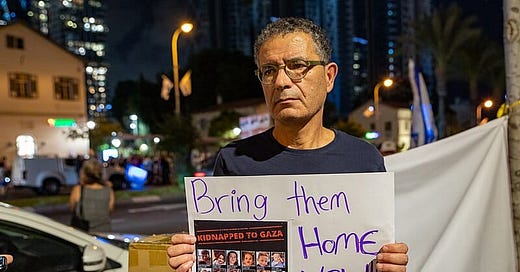An Absurdly Inequitable Deal Is Not a Deal
"We cannot let our citizen hostages who were failed by the State be allowed to remain pawns being used by the enemy who abducted them. Israel must not fail them again."
By Rick Borenstein
My several week R&R in the United States is now over and I am back in Israel. It is Day 128 — and it feels a bit weird to be happy to be back in a war zone. Most everyone is dour and on edge. I, on the other hand, feel like I’m back fulfilling some kind of personal obligation to do what I can for this country that has adopted me. Friends and family in the US told me they depended on my commentary to understand what was going on here, so I continue it now that I’m back. It is my way of volunteering.
Any hope that the war would be over by now has obviously vanished. What has become clear is that Israel, despite its “better than expected” results on the battlefield, is struggling with a monumental, almost contradictory dilemma that dominates the news, social media and every conversation I have. There is a fundamental inconsistency in Israel’s twin goals of destroying Hamas and returning our hostages. Depending on who you talk to or listen to, one or the other goal obviously takes precedence. In fact, a recent poll suggests that the country is equally divided on the question. Don’t get me wrong, everyone wants the hostages back, but at what cost to the overall need to shore up our security and “finish the job”? Of course, we cannot let our citizen hostages who were failed by the State be allowed to remain pawns being used by the enemy who abducted them. We must not fail them again. Yet conceding to the Hamas’ demands would fail the national interest we have been fighting for.
To a certain extent, last week’s Hamas’ answer to the hostage proposal put forth by Qatar, the US, Egypt and Israel makes the question irrelevant since their demands stand no chance of being accepted; a true non-starter for Israel. Are we to walk away after 125 days of fighting, with soldiers risking their lives (225 have died and thousands were injured) and in effect achieve nothing? That’s what Hamas proposes. According to them, the IDF withdraws from Gaza, Hamas stays in power and billions flow in for reconstruction from Arab nations. Security has not improved. Two years later or 10 years later, we do this insanity again. Meanwhile, thousands of Israelis forced to leave their homes in the Negev and northern border area are unable to return home. That is not a deal, that is capitulation. At every soldier’s funeral, the words “may it not be in vain” are spoken. Such a result would make it all in vain.
Yet pro hostage demonstrators argue there is no cost too high to secure the return of those hostages still alive and the bodies of those who have died. The demonstrations and PR blitz of the hostage families has been effective at convincing a large swath of the Israeli population to prioritize this outcome. The airwaves are filled with desperate stories told by released female hostages and family members of those remaining in Gaza. I’ve heard several people say “All for All” meaning all the 8,600 or so Palestinian prisoners Israel currently holds, for all the hostages. Should we be releasing the thousand or so prisoners who participated in the October 7thmassacre? Should we be releasing the 500 prisoners Hamas wants to hand pick who were convicted of murder and/or terrorism? Should we release Marwan Barghouti, a prominent Palestinian politician and murderer of many Israelis because Hamas asked for him? Are they negotiating, or are they just delusional?
I don’t claim to have an answer to this seemingly intractable dilemma. Yahya Sinwar, the Hamas head and architect of the October 7th massacre, will not project defeat if he has the hostages that Israel cannot and will not walk away from. Thirteen years ago, Netanyahu and the Israeli government made a catastrophic mistake of trading 1,027 prisoners for one soldier, Gilad Shalit, thus setting a similar expectation by Hamas now. Tragically, Sinwar was one of 280 prisoners serving a life sentence released in the 2011 exchange.
In fact, we don’t even know for sure how many hostages are still alive. Just last Thursday, speculation surfaced that 50 of the 130 remaining hostages are already dead.
There’s one more thing that’s caught my attention since returning. Two voices of reason on the War Cabinet, Benny Gantz and Gadi Eisenkot, have called for the cessation of aid deliveries to Gaza. Their reasoning is as follows. All aid deliveries entering Gaza are being purloined by Hamas. 60% of the aid is going directly to support the Hamas war effort, while the remaining 40% is being sold to the citizenry. Hamas is directly profiting from humanitarian aid supplied for free by the US, UN and others. I don’t think anyone wants to further exacerbate the already disastrous conditions of the people of Gaza, but something must change.
Rafah, temporary home to half of Gaza’s population, is the next IDF objective. Political realities between Egypt and Israel regarding operations on the border must be ironed out, but progress is being made. Maybe we will find the Hamas leadership there, or maybe they have already fled to Egypt or places unknown. Either way, it is likely to get worse before it gets better. How many times have I said that before?
Rick Borenstein is a “Silicon Valley escapee” who now lives with his family in Israel. He a coach, investor, NGO adviser — and Tel Aviv-booster.
From unpacking history and politics to navigating the nuances of family and personal relationships to finding the human angle on sports and entertainment — plus our unsparing take on what’s happening in the Jewish world — the canvas at JEWDICIOUS is limitless! JOIN US!!





